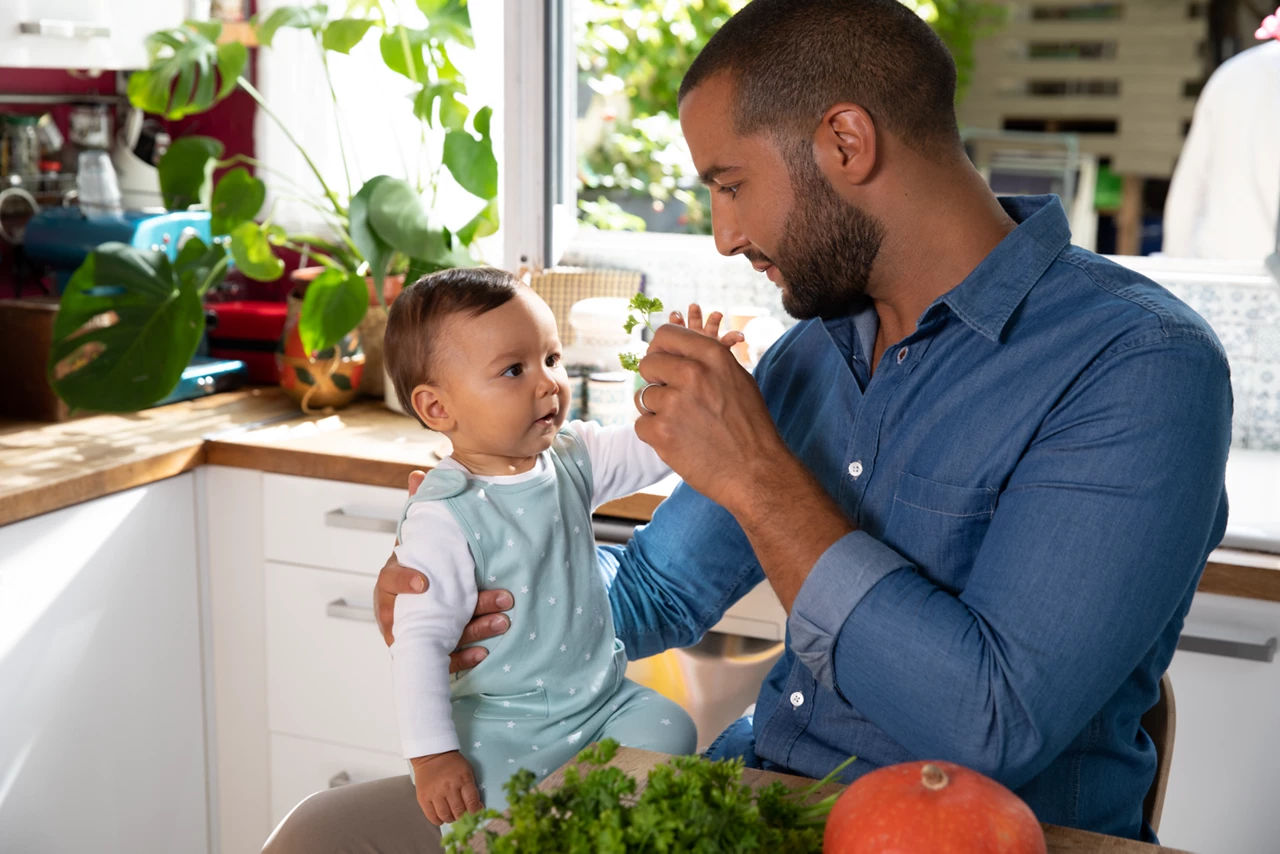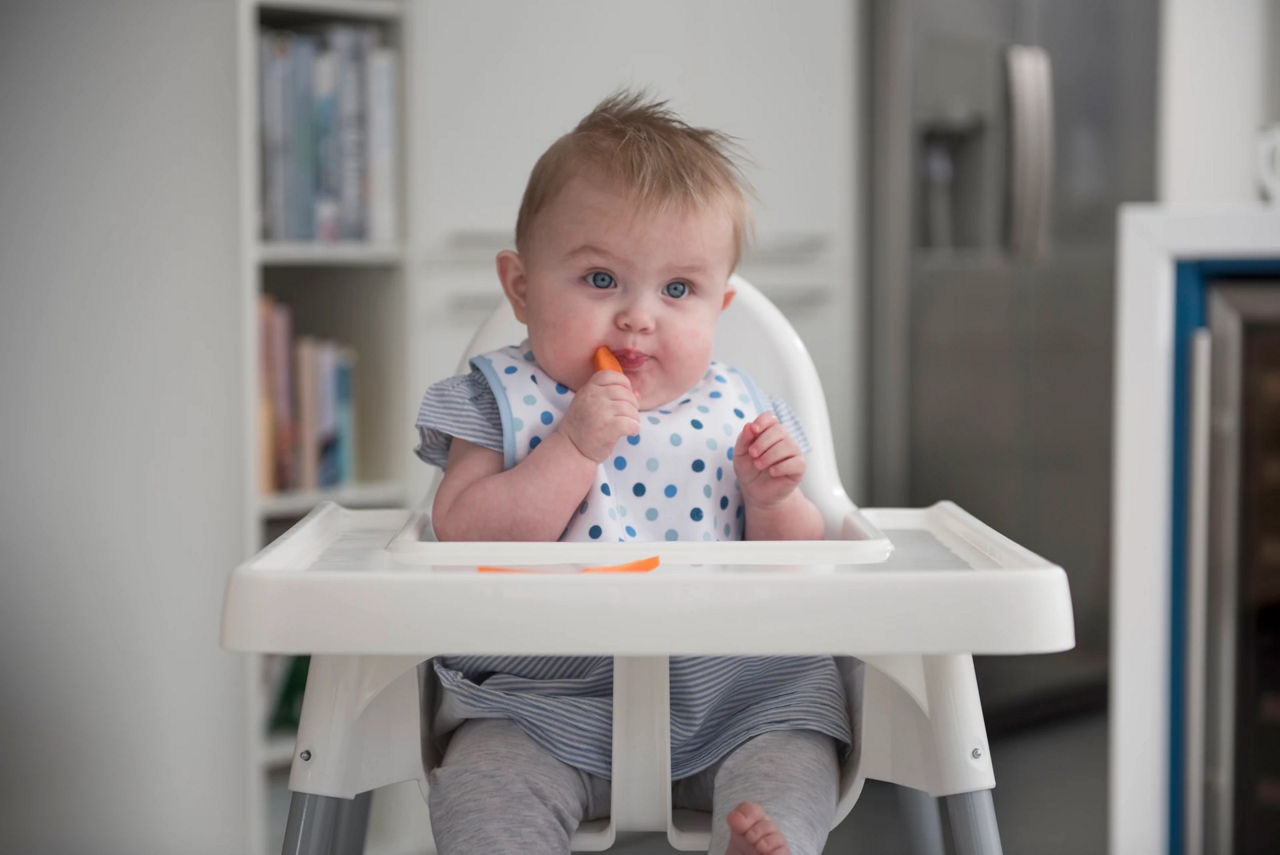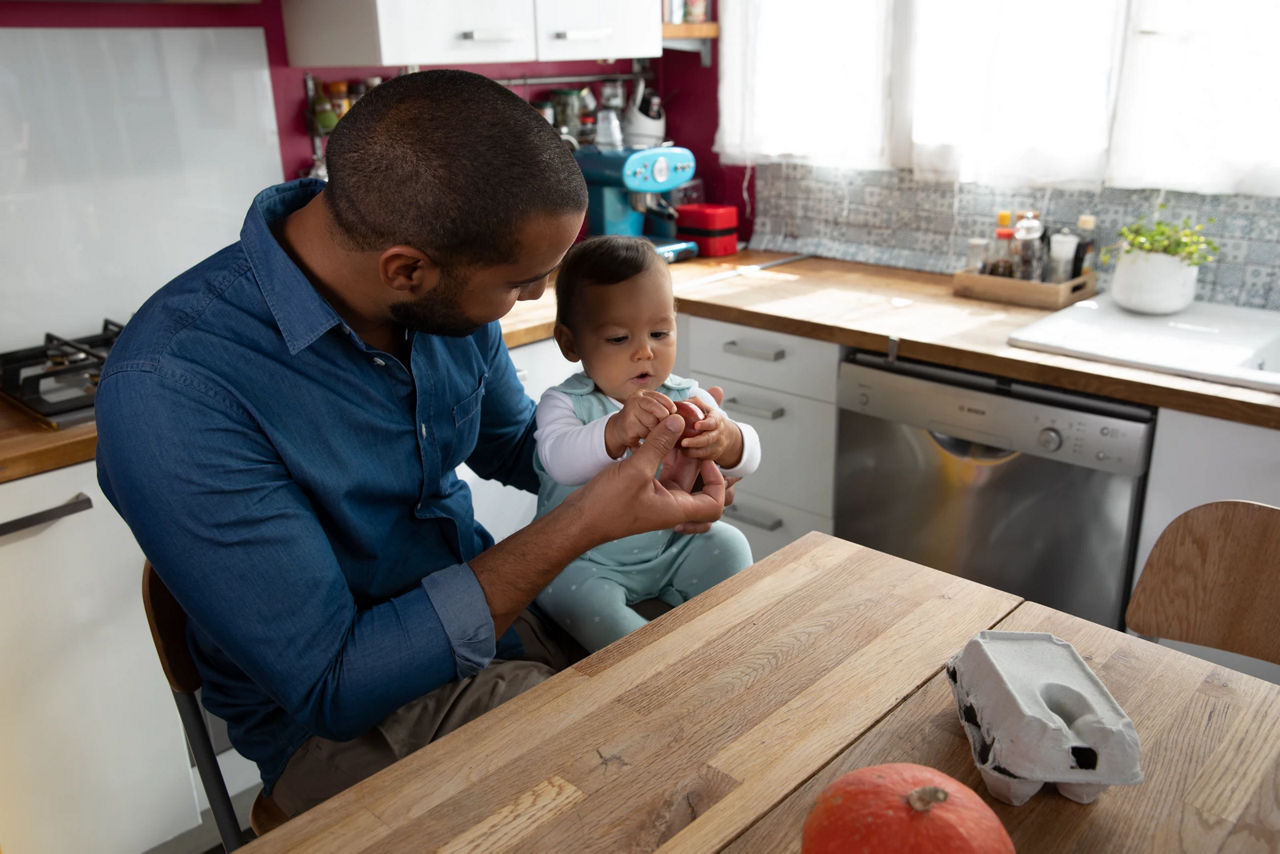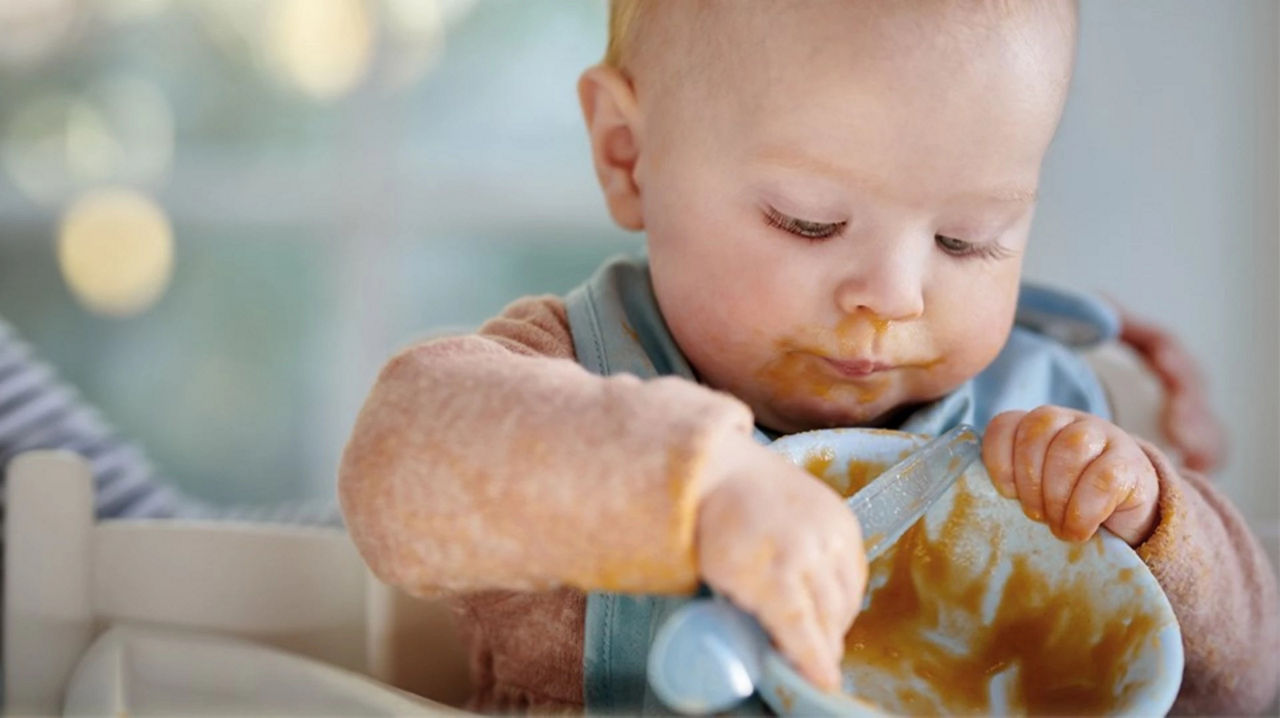Your baby will grow more rapidly during their first year than at any other time in their life. Within this period of intense development, their nutritional needs naturally change and evolve and, at around 6 months, a milk-only diet will no longer provide enough energy for growth, or important minerals such as iron. Learn how to recognise the signs that your baby is ready for more and read our weaning tips for the early days of starting solids.
What is weaning? - Baby weaning guide & advice
Food, glorious food
Everything you need to know about weaning

How does my baby learn to eat?
Learning to eat solid foods is a gradual process. The first step is to recognise the signs they are ready to wean.
At around 6 months your baby is likely to be able to sit up with support, have increased control of their head movement, and can make stronger sucking actions. Your baby’s ‘tongue-thrust reflex’ (thrusting their tongue forward whenever the back of their throat is stimulated) and gag reflex become less pronounced and will enable them to swallow foods, so this is usually an ideal time to start weaning.
But there's no need to rush. At this stage your baby will still be getting most of their nourishment from breast milk or formula milk.
Where do I start?
When you first introduce solid foods, it’s best to choose a time when your baby is calm and alert, and you have plenty of time to let them explore and experiment, as well as deal with any mess. Try not to give them solids when they are really hungry, too tired or expecting their usual milk, as they could get frustrated.
To begin with you may notice that your baby pushes food back out of their mouth. This doesn’t mean they don’t like the food. Until now your baby has only ever encountered liquids and they have to learn to move more solid foods around their mouth and swallow. A lot may simply come back out again. While frustrating and messy, this is all part of learning to eat and these skills are also important for speech development.
If your baby consistently refuses food, it could simply mean that they’re not ready for weaning, so stop and try again another day.
It will take time for your baby to get used to the sensation and taste of food in their mouth, and at first, weaning involves a lot of trial, error and perseverance. Start by offering a small amount of puréed food from the tip of a spoon. One to two teaspoons is enough to start with. Your baby will soon learn to form a bolus (a small mass of food) and move it to the back of their mouth to swallow it.
Your baby may sometimes cough, splutter and gag as they learn to deal with more solid foods. Gagging is, in fact, a natural reflex that helps to clear food away from their airway. While concerning to watch, this is all part of learning to eat solid foods and will happen less as your baby becomes more adept at eating.
As your baby gets the hang of eating, you can gradually build up the amount and type of foods you offer, until they’re enjoying two to three varied meals each day. If your baby seems enthusiastic, it's fine to offer them more.
You may notice that your baby has definite preferences from very early on. Although it can be tempting to repeatedly offer their favourites, the wider the variety of fruits, vegetables and flavours they experience during weaning, the more likely they will be to eat a varied diet once they hit the toddler stage.
 Introducing your baby to lots of new tastes will encourage them to enjoy a variety of foods later on
Introducing your baby to lots of new tastes will encourage them to enjoy a variety of foods later on
It’s worth bearing in mind it can take several attempts for your baby to accept a new food, sometimes as many as eight or even 10 tastes before they like it. So if they don’t take to a certain food at first, keep trying.
You could try making up purée and freezing it in ice cube trays so you have a mixture of tastes ready to offer every day.
Weaning your baby takes time and patience. Learning to eat is very different to sucking milk from a breast or a bottle.
Discovering new tastes and textures at 7–12 months
The consistency, texture and range of foods need to change as your baby grows. Your baby will soon learn to bite and chew, hold a spoon and eventually feed themself, so this is the perfect opportunity to encourage them to eat a varied, balanced diet and establish healthy eating habits that will last into childhood and beyond.
At this age, once your baby has learned to take soft food from a spoon, you can think about introducing mashed foods with soft lumps. Your baby will also be able to pick things up, so offer soft finger foods too, such as cooked carrot sticks or fingers of toast.
This is also the time to introduce foods rich in a range of important vitamins and minerals, such as iron. Offer your baby a wider variety of puréed and mashed foods such as meats, fish, beans or dahls (made without salt), eggs (cooked thoroughly so that the whites and yolks are solid), smooth nut butters and fruit and vegetables. Include some starchy food as well, such as potatoes, rice, pasta and couscous. Full-fat dairy foods such as yogurts, cheese and custards are all excellent weaning foods, but remember that breast milk or formula should still be their main milk drink until at least their first birthday.
Aim for a healthy, balanced diet, similar to that for yourself, but without salt or added sugar. Include good sources of protein, such as meat, fish, eggs, beans or smooth nut butters; fruits and vegetables; calcium-rich dairy foods; and starchy carbohydrate foods like rice, porridge, bread and pasta.
What about baby-led weaning?
Baby-led weaning gained popularity after Gill Rapley’s book was published in 2008. It works on the theory that when solid foods are introduced, babies should be encouraged to feed themselves, with little or no help from mum. Usually this involves finger food such as steamed carrots and broccoli.
Although baby-led weaning has various benefits, we recommend beginning with purées. Starting with a variety of softer puréed foods is a safe and effective method that helps babies get the wide range of nutrients they need. The HSE supports this advice.
However you choose to introduce your baby to solids, it’s important to look for the signals that tell you they’ve had enough. They may turn their head or simply close their mouth.
Once your baby progresses to soft finger foods, they can practise self-feeding and practise their hand-to-mouth coordination.
Related articles

Get in touch with our Careline experts
Our nutritionists and feeding advisors are always on hand to talk about feeding your baby. So if you have a question, just get in touch
- NHS UK. Weaning your baby [Online]. 2011. Available at: www.nhs.uk/ipgmedia/national/british%20nutrition%20foundation/assets/weaningyourbaby.pdf [Accessed July 2014]
- NHS UK. What to feed young children [Online]. 2014. Available at: www.nhs.uk/conditions/pregnancy-and-baby/pages/understanding-food-groups.aspx [Accessed July 2014]
- Wright CM et al. Matern Child Nutr 2011;7(1):27-33.
- Farrell E. Paediatric Group of the British Dietetic Association. Weaning your Child [Online]. 2011. Available at: www.bda.uk.com/foodfacts/WeaningYourChild [Accessed July 2014]
- Nicklaus S (2011) Childrens acceptance of new foods at weaning. Role of practices of weaning and of sensory food properties. Appetite 57: 812-815
Last reviewed: 5th September 2016





?ts=1701285588461&dpr=off)